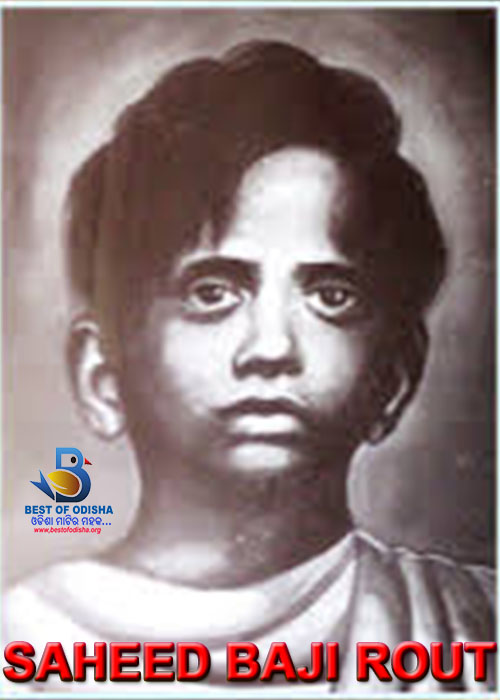In the year 1938 when people in various States were agitating against their respective ruling chiefs. But the supreme sacrifice of the thirteen-year-old boy Baji Rout had given the necessary momentum to the movement that ultimately wiped out kingship from India.
Baji Rout, the light of liberty, was born in 1925 in the Village of Nilakanthapur in Dhenkanal, His father Hari Rout, had passed away when he was a tiny tot. He was brought up by his mother who was thriving on wages earned by rice-husking in the neighborhood. He had watched how mercilessly the King of Dhenkanal, Shankar Pratap Singhdeo was fleecing the poor villagers including his mother of their earnings by using armed forces. So, when Baishnab Charan Pattanayak of Dhenkanal town, later famous as Veer Baishnav, raised a banner of revolt against the King and founded Prajamandal, Baji joined it despite tender age.
Baishnav Charan Pattanayak deliberately joined as a painter in the Railways in order to be able to move from place to place free of cost by using a railway pass he was to obtain. Taking advantage of this Pass he not only started moving from place to place along the Railway track, instigating people against the King, but also established contacts with leaders of National Congress at Cuttack and attracted their attention to the plight of the people of Dhenkanal.
He associated himself with the only revolutionary journal of those days, THE KRUSHAKA, which was being produced and published by the Marxists. Thus, while educating himself in Marxist revolutionary theory and practices, he prevailed upon local intellectual Hara Mohan Pattanayak and founded the people’s movement called “Prajamandal Andolana”. The tortured people of Dhenkanal joined this movement with rare and unheard of courage. Soon, subjects of adjoining Princely States also formed Praja Mandalas in their respective States.
Seeing this, many other kings offered their cooperation to the king of Dhenkanal to suppress the people’s movement. King of Bolangir R.N.Singhdeo, King of Kalahandi P.K.Deo, Shankar Pratap’s father-in-law who was the King of Saraikala and the king of Keonjhar sent their armed troops to Dhenkanal to terrorize the people. The British authorities also sent from Kolkata a platoon of soldiers comprising 200 gunmen to assist him. The King of Dhenkanal unleashed a reign of terror to suppress the mass movement.
For maintenance of these outside forces, Shankar Pratap clamped another tax on the people, called ‘Raj Bhakta Tax’ or Loyalty Tax. He declared that whosoever fails to pay this tax, shall be adjudged a traitor and punished accordingly.
The houses of the people who did not pay the Raj Bhakta Tax were being razed to ground by use of royal elephants and all their properties were being confiscated. Such repressive measures failed to deter the people from joining the movement.
Deciding to crush the movement forever, the king pressed his entire force against the leaders of the movement. All the ancestral properties of Veer Baishnav were confiscated. Hara Mohan Pattanayak and other top leaders were taken into custody in a surprise raid on September 22, 1938. But the royal forces could not arrest Veer Baishnav Pattanayak.
While frantically searching for him, news reached the palace that he was camping in the Village of Bhuban. The armed forces of the King attacked Bhuban on October 10, 1938 for the third time and destroyed many houses by using the elephants and tortured many persons. But they could not elicit any information on Veer Baishnav despite use of all sorts of brutality.
They arrested as many as eight persons and let loose terror to elicit information on Baishnav Pattanayak. At this stage a source informed that he has escaped by jumping into the river Brahmani and swam across to the villages on the other side. The troop started immediate chase. People obstructed. To disperse them, they started firing. Two of the villagers lost their life on the spot. The troop rushed to the nearest ferry at Nilakanthapur on River Brahmani.
Baji Rout was on the guard at the Ghat at that time. He was ordered by the troop to ferry them across. He refused.
By that time he had heard from those who fled from Bhuban details of the brutality the troop had resorted to there and had understood that if Veer Baishnav Pattanayak was to be protected, the troops were to be obstructed. He therefore refused to comply with the command.
The royal troop threatened to kill him if he did not ferry them across immediately. He rejected their orders again. Surrender to the Prajamandal first, he retorted.
A soldier hit his head with the butt of his gun that fractured his skull severely. He collapsed. But he rose. He collected whatever little strength was left in him, and raising his voice to the highest pitch beyond even his strength, warned his villagers of the presence of the royal troop. A soldier pierced his bayonet into the soft skull of the brave boy even as another fired at him. Somebody who was watching this cruelty run to the people and informed them. Charged with wrath and contempt, people in hundreds rushed to the spot like angry lions. Seeing them, instead of running after Baishnav Pattanayak, the panicked troop fled for life.
Taking hold of Baji’s boat after killing him, the troop oared away in utmost haste; but while escaping, opened fire on the chasing masses causing four more deaths.
0











